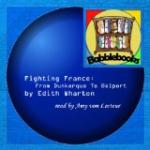Since leaving Paris yesterday we have passed through streets and streets of such murdered houses, through town after town spread out in its last writhings; and before the black holes that were homes, along the edge of the chasms that were streets, everywhere we have seen flowers and vegetables springing up in freshly raked and watered gardens. My pink peonies were not introduced to point the stale allegory of unconscious Nature veiling Man’s havoc: they are put on my first page as a symbol of conscious human energy coming back to replant and rebuild the wilderness...
Last March, in the Argonne, the towns we passed through seemed quite dead; but yesterday new life was budding everywhere. We were following another track of the invasion, one of the huge tiger-scratches that the Beast flung over the land last September, between Vitry-le-Francois and Bar-le-Duc. Etrepy, Pargny, Sermaize-les-Bains, Andernay, are the names of this group of victims: Sermaize a pretty watering-place along wooded slopes, the others large villages fringed with farms, and all now mere scrofulous blotches on the soft spring scene. But in many we heard the sound of hammers, and saw brick-layers and masons at work. Even in the most mortally stricken there were signs of returning life: children playing among the stone heaps, and now and then a cautious older face peering out of a shed propped against the ruins. In one place an ancient tram-car had been converted into a cafe and labelled: “Au Restaurant des Ruines”; and everywhere between the calcined walls the carefully combed gardens aligned their radishes and lettuce-tops.
From Bar-le-Duc we turned northeast, and as we entered the forest of Commercy we began to hear again the Voice of the Front. It was the warmest and stillest of May days, and in the clearing where we stopped for luncheon the familiar boom broke with a magnified loudness on the noonday hush. In the intervals between the crashes there was not a sound but the gnats’ hum in the moist sunshine and the dryad-call of the cuckoo from greener depths. At the end of the lane a few cavalrymen rode by in shabby blue, their horses’ flanks glinting like ripe chestnuts. They stopped to chat and accept some cigarettes, and when they had trotted off again the gnat, the cuckoo and the cannon took up their trio...
The town of Commercy looked so undisturbed that the cannonade rocking it might have been some unheeded echo of the hills. These frontier towns inured to the clash of war go about their business with what one might call stolidity if there were not finer, and truer, names for it. In Commercy, to be sure, there is little business to go about just now save that connected with the military occupation; but the peaceful look of the sunny sleepy streets made one doubt if the fighting line was really less than five miles away... Yet the French, with an odd perversion of race-vanity, still persist in speaking of themselves as a “nervous and impressionable” people!




